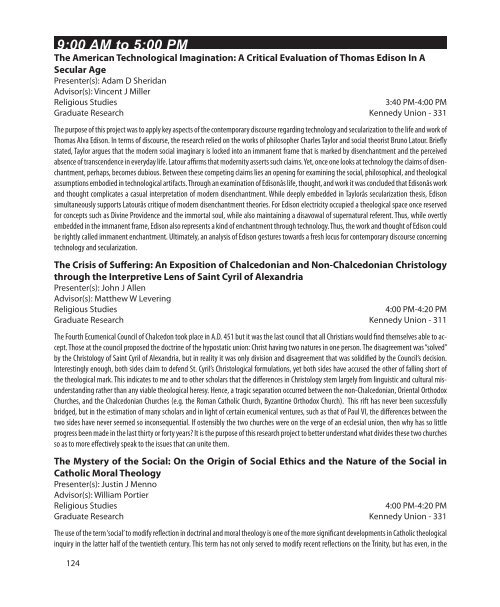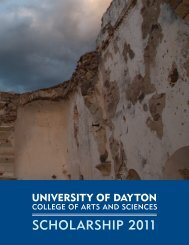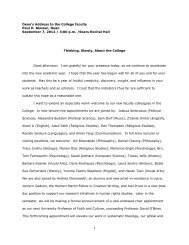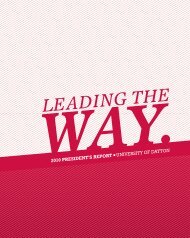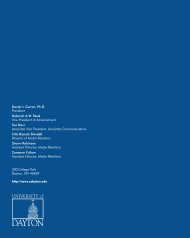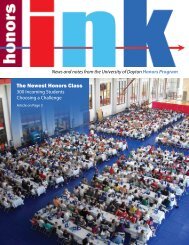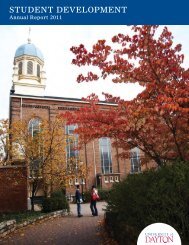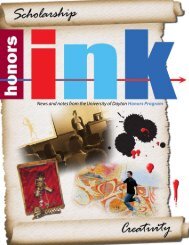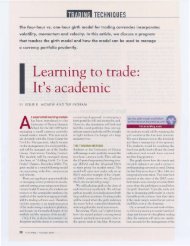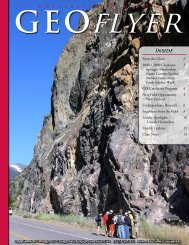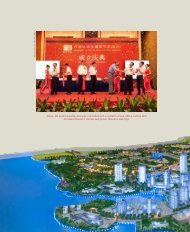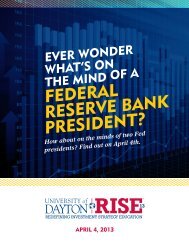Stander Symposium abstract book - University of Dayton
Stander Symposium abstract book - University of Dayton
Stander Symposium abstract book - University of Dayton
Create successful ePaper yourself
Turn your PDF publications into a flip-book with our unique Google optimized e-Paper software.
9:00 AM to 5:00 PM<br />
The American Technological Imagination: A Critical Evaluation <strong>of</strong> Thomas Edison In A<br />
Secular Age<br />
Presenter(s): Adam D Sheridan<br />
Advisor(s): Vincent J Miller<br />
Religious Studies<br />
3:40 PM-4:00 PM<br />
Graduate Research Kennedy Union - 331<br />
The purpose <strong>of</strong> this project was to apply key aspects <strong>of</strong> the contemporary discourse regarding technology and secularization to the life and work <strong>of</strong><br />
Thomas Alva Edison. In terms <strong>of</strong> discourse, the research relied on the works <strong>of</strong> philosopher Charles Taylor and social theorist Bruno Latour. Briefly<br />
stated, Taylor argues that the modern social imaginary is locked into an immanent frame that is marked by disenchantment and the perceived<br />
absence <strong>of</strong> transcendence in everyday life. Latour affirms that modernity asserts such claims. Yet, once one looks at technology the claims <strong>of</strong> disenchantment,<br />
perhaps, becomes dubious. Between these competing claims lies an opening for examining the social, philosophical, and theological<br />
assumptions embodied in technological artifacts. Through an examination <strong>of</strong> Edisonâs life, thought, and work it was concluded that Edisonâs work<br />
and thought complicates a casual interpretation <strong>of</strong> modern disenchantment. While deeply embedded in Taylorâs secularization thesis, Edison<br />
simultaneously supports Latourâs critique <strong>of</strong> modern disenchantment theories. For Edison electricity occupied a theological space once reserved<br />
for concepts such as Divine Providence and the immortal soul, while also maintaining a disavowal <strong>of</strong> supernatural referent. Thus, while overtly<br />
embedded in the immanent frame, Edison also represents a kind <strong>of</strong> enchantment through technology. Thus, the work and thought <strong>of</strong> Edison could<br />
be rightly called immanent enchantment. Ultimately, an analysis <strong>of</strong> Edison gestures towards a fresh locus for contemporary discourse concerning<br />
technology and secularization.<br />
The Crisis <strong>of</strong> Suffering: An Exposition <strong>of</strong> Chalcedonian and Non-Chalcedonian Christology<br />
through the Interpretive Lens <strong>of</strong> Saint Cyril <strong>of</strong> Alexandria<br />
Presenter(s): John J Allen<br />
Advisor(s): Matthew W Levering<br />
Religious Studies<br />
4:00 PM-4:20 PM<br />
Graduate Research Kennedy Union - 311<br />
The Fourth Ecumenical Council <strong>of</strong> Chalcedon took place in A.D. 451 but it was the last council that all Christians would find themselves able to accept.<br />
Those at the council proposed the doctrine <strong>of</strong> the hypostatic union: Christ having two natures in one person. The disagreement was “solved”<br />
by the Christology <strong>of</strong> Saint Cyril <strong>of</strong> Alexandria, but in reality it was only division and disagreement that was solidified by the Council’s decision.<br />
Interestingly enough, both sides claim to defend St. Cyril’s Christological formulations, yet both sides have accused the other <strong>of</strong> falling short <strong>of</strong><br />
the theological mark. This indicates to me and to other scholars that the differences in Christology stem largely from linguistic and cultural misunderstanding<br />
rather than any viable theological heresy. Hence, a tragic separation occurred between the non-Chalcedonian, Oriental Orthodox<br />
Churches, and the Chalcedonian Churches (e.g. the Roman Catholic Church, Byzantine Orthodox Church). This rift has never been successfully<br />
bridged, but in the estimation <strong>of</strong> many scholars and in light <strong>of</strong> certain ecumenical ventures, such as that <strong>of</strong> Paul VI, the differences between the<br />
two sides have never seemed so inconsequential. If ostensibly the two churches were on the verge <strong>of</strong> an ecclesial union, then why has so little<br />
progress been made in the last thirty or forty years? It is the purpose <strong>of</strong> this research project to better understand what divides these two churches<br />
so as to more effectively speak to the issues that can unite them.<br />
The Mystery <strong>of</strong> the Social: On the Origin <strong>of</strong> Social Ethics and the Nature <strong>of</strong> the Social in<br />
Catholic Moral Theology<br />
Presenter(s): Justin J Menno<br />
Advisor(s): William Portier<br />
Religious Studies<br />
4:00 PM-4:20 PM<br />
Graduate Research Kennedy Union - 331<br />
The use <strong>of</strong> the term ‘social’ to modify reflection in doctrinal and moral theology is one <strong>of</strong> the more significant developments in Catholic theological<br />
inquiry in the latter half <strong>of</strong> the twentieth century. This term has not only served to modify recent reflections on the Trinity, but has even, in the<br />
124


